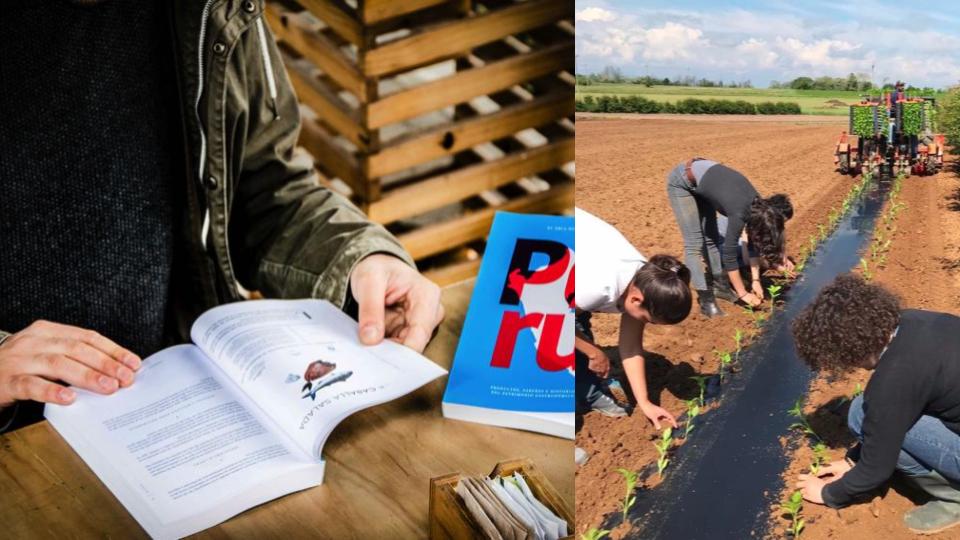PRIME will develop and demonstrate advanced green chemistry processes capable of transforming renewable raw materials and waste available on the Piedmont territory in bioproducts and biomaterials with functional properties comparable and / or improved with respect to those existing on the market, with significant spillovers in sectors strategic for the regional economic development, such as agriculture and food packaging.

SCIENTIFIC MANAGER: Luisa Torri
OTHER UNISG RESEARCHERS INVOLVED: Paola Migliorini, Franco Fassio, Chiara Chirilli
PARTNERSHIP: Novamont (Italy), Centro Ricerche Fiat (Italy), Sinterama (Italy), Sedamyl (Italy), Environment Park (Italy), Istituto Italiano di Tecnologia (Italy), Politecnico di Torino – DISAT (Italy), Università di Torino – Dipartimento di Chimica (Italy), Università di Torino – Dipartimento di scienze della vita e biologia dei sistemi (Italy), Agrinnova (Italy), Università degli Studi del Piemonte Orientale (Italy), Fondazione Benvenuti in Italy (Italy), Università degli Studi di Trieste – Dipartimento di Scienze Chimiche e Farmaceutiche (Italy), Proplast (Italy), De Martini Bayart & Textifibra (Italy), Grinp (Italy), Biosphere (Italy), HYSYTECH (Italy), Costantino & C. (Italy), Roelmi Hpc (Italy), Farmaceutici Procemsa (Italy), Circ (Italy), Reynaldi (Italy), Gallicchio Stampi (Italy), Verplast (Italy).
DURATION OF THE PROJECT: 36 months
FUNDING INSTRUMENT: Bando Piattaforma Tecnologica Bioeconomia – Fondo FESR della Regione Piemonte (Determina n. 234 – 19/04/2019)
WEB SITE: novamont.com/prime
SDGs:
![]()
![]()
Description
The market for biobased and compostable plastics is expected to grow as a function of the growing search for greater environmental compatibility of plastic materials. In particular, as highlighted in the study “Biopolymers facts and statistics 2016” published by the Institute for Bioplastics and Biocomposites of the University of Hannover, the global production capacity of bioplastics is expected to reach 9.4 million by 2020, of which 1.7 million tons biodegradable.
In such a complex scenario of challenges and opportunities, green chemistry processes for low impact bio-refineries can represent an important accelerator for the development of agro-industrial chains. Starting from renewable resources available in the area which are not in competition with the food and feed supply chain (e.g. crops dedicated in marginalized and / or polluted and / or non-competitive areas, agro-industrial waste, waste oils and sugars, etc.), these agro-industrial chains can lead to the creation of biomaterials and bio-products with low impact and high performance, capable of diversifying production and increase its value, in order to compete in the international economic environment and attract new investments.
Therefore, PRIME aims to study, develop and demonstrate advanced green chemistry processes in integrated biorefineries capable of enhancing renewable raw materials, waste and process by-products in highly innovative bio-products and biomaterials.

In particular, UNISG will actively participate in the project by launching experimental tests in the agricultural and food-packaging fields and by identifying indicators for monitoring the impact of the project from a Circular Economy for Food perspective.
Specifically, UNISG will evaluate biodegradable mulch sheets, comparing different agroecological practices for the management of spontaneous plants in organic agriculture and evaluating the effect of mulching on horticultural plants with regard to agronomic, qualitative, ecological and economic aspects. In parallel, UNISG will take care of estimating in the Sensory Analysis Laboratory the sensorial shelf life of fresh food stored in innovative packaging that will be designed and produced by the other project partners.

Finally, researchers from the university will develop a Work Package with the aim of identifying indicators for monitoring the impact of the project with a view to circular economy: the measurement of circularity is in fact an essential requirement to pursue concrete actions and achieve results that can be communicated, and therefore to tend towards greater transparency for the market and the consumer.
Publications
Fassio, F., Chirilli, C. Circular economy and food system: a review of principal measuring tools. Sustainability 2023, 15, 10179. https://doi.org/10.

